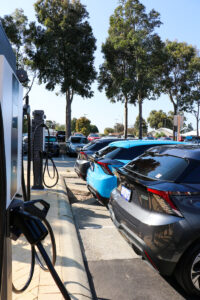
Seeking to reduce its carbon emissions across the shire, the City of Gosnells has formally adopted a comprehensive Emissions Reduction Strategy (ERS).
The ERS aims to support informed decision-making by helping the City understand how various choices impact emissions and their costs, while presenting opportunities to reduce emissions through three main priorities: heating the pool at Leisure World with solar instead of gas and transitioning away from fossil fuel-powered trucks and utes.
If fully realised, it’s expected these three priority options would achieve a reduction of 1,360 tonnes of CO2-e in the city, representing a 30 per cent decrease in total emissions.
Of the other 16 recommendations in the ERS, key actions include maintaining a watching brief for developments in hydrogen-heavy commercial vehicles, trialling the use of solar-powered public lighting, and formalising a solar PV transition plan for all remaining sites.
Additionally, the City plans to explore the feasibility of commercial batteries and energy-generating solar car parks and develop a public lighting LED transition program.

With the ERS showing the City reduced carbon emissions from 6,210 tonnes in 2020/21 to 5,586 tonnes in 2021/22 and 4,500 tonnes in 2022/23, Mayor Theresa Lynes said she believes the City is on the right track when it comes to reducing its carbon footprint.
“The City has already enjoyed considerable success reducing carbon emissions by 27 per cent over the past three years, which is a fantastic result,” Mayor Lynes said.
“The new Emissions Reduction Strategy, combined with the City’s Sustainability Action Plan that was adopted last year, will build on this success to provide a cleaner and brighter future for our whole community.”
The report identifies diesel as the largest source of emissions in the City at 58 per cent, followed by electricity usage at 23 per cent and gas at 15 per cent.
Proud to be the first CEO in Gosnells history to lead the implementation of an Emissions Reduction Strategy, City of Gosnells CEO Ian Cowie believes the solar hot water system at Leisure World could be the first strategy to be implemented.

“We are currently awaiting the outcome of a grant application that, if successful, will support the City to establish a solar hot water system at Leisure World and reduce reliance on gas.” – City of Gosnells CEO Ian Cowie
“The funding request was for $109,900, with the City to contribute $120,000. It is estimated that this one opportunity will reduce emissions by 375 tonnes of carbon dioxide equivalents per year.”
Mr Cowie stated that an essential component in achieving a modern, low-emissions fleet would be the supporting infrastructure when the City builds a new operations depot designed to meet these needs.

At last week’s council meeting, some councillors expressed their beliefs that, in some cases, the renewable energy industry isn’t as clean as it appears, but were pleased to support the City’s ERS.
“Until the recharging of the batteries actually comes from genuine green energy, it’s actually disadvantage C02 wise if you’re charging your EV with gas or coal-fired generated electricity,” Councillor Peter Abetz said.
“Anything where ratepayers would be paying a massive amount extra, for the sake of reducing C02 emission slightly, I just don’t think is justifiable, and that’s why I’m pleased to see that in the report, it will be watching what the developments are in some areas, and we only tackle the ones where there’s a clear economic advantage to the City.”
Currently, there is no law requiring local governments to report their emissions.













